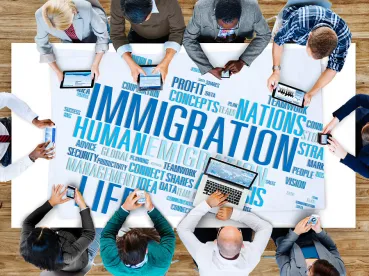In connection with the Trump Administration’s desire to crack-down on its perceived misuse of the H-1B visa category, various U.S. government agencies have announced a coordinated effort in re-interpreting regulations as well as newly focused enforcement initiatives.
Change in Position on H-1Bs for Computer Programmers and on Level I Prevailing Wages for H-1B Specialty Occupations
On March 31, 2017, the U.S. Citizenship and Immigration Services (“USCIS”) issued a new Policy Memorandum (“PM”) which clarifies USCIS’s approach in determining whether the position of “Computer Programmer” is deemed a “specialty occupation” which would be eligible for an H-1B visa. The new PM rescinds an existing 17-year-old PM which offered guidance to adjudicators on the computer technology sector necessary because of recent advancements in the industry rendering the old PM obsolete. Entry level Computer Programmer positions in which the applicant has an Associate’s Degree will no longer qualify for H-1B status. Employers must now show that the position requires theoretical and practical application of a body of highly specialized knowledge, which requires the attainment of a bachelor’s degree or higher in a specific specialty. Although the memo focuses on Computer Programmers, the memo also seems to support the position that one cannot simultaneously have a job classification which requires application of a body of high specialized knowledge, and pay rate at the low end of the industry salary range, meaning a Level I wage rate.
Newly Focused H-1B Worksite Audit Initiative by USCIS
In another change, on April 3, 2017, the USCIS announced multiple measures to deter and detect H-1B visa fraud and abuse. Starting April 3rd, the USCIS will take a more targeted approach when making site visits across the country to H-1B petitioners and to the worksites of H-1B employees. USCIS will now focus its enforcement efforts on auditing employers who employ H-1B computer personnel for contract positions, including:
-
Cases in which the USCIS cannot validate the employer’s basic business information through commercially available data;
-
H-1B-dependent employers (those who have a high ratio of H-1B workers as compared to U.S. workers, as defined by statute); and,
-
Employers petitioning for H-1B workers who work off-site at another company or organization’s location.
USCIS believes targeted site visits will permit focus of resources where fraud and abuse of the H-1B program may be more likely to occur, and to assist in determining whether H-1B dependent employers are evading their obligation to make a good-faith effort to recruit U.S. workers. Under the new enforcement initiative, the USCIS will continue random and unannounced visits nationwide (which it has been doing since 2009) with new vigor. These site visits are not meant to target nonimmigrant employees for any kind of criminal or administrative action, but rather, to identify employers who are abusing the system.
Apparently the USCIS believes that employers abusing the H-1B visa program negatively affect U.S. workers, decreasing wages and job opportunities as they import more foreign workers. The USCIS has established an email address: REPORTH1BABUSE@USCIS.DHS.GOV which will allow individuals (including both U.S. workers and H-1B workers who suspect they or others may be the victim of H-1B fraud or abuse) to submit tips, alleged violations and other relevant information about potential H-1B fraud or abuse. Information submitted to the email address will be used for investigations and referrals to law enforcement agencies for potential prosecution. The USCIS will continue to refer cases of suspected fraud or abuse to U.S. Immigration and Customs Enforcement (ICE).
New USDOL Effort on Preventing Discrimination Against U.S. Workers in H-1B Process
On April 5, 2017, the U.S. Department of Labor (“DOL”) announced plans to protect U.S. workers from H1B program discrimination by providing greater transparency and oversight in coordination of efforts by the U.S. Department of Homeland Security (“DHS”) and the Justice Department.
The H-1B program allows employers to hire highly skilled foreign workers in specialty occupations. The H1B visa program authorizes the temporary employment of qualified individuals who are not otherwise authorized to work in the U.S. According to the DOL, some employers have used the H1B program to hire foreign workers despite American workers being qualified and available for work or even to replace American workers.
The DOL announced that it fully supports the Justice Department in cautioning employers who petition for H1B visas not to discriminate against U.S. workers, as well as the DHS’s measures to further deter and detect H1B visa fraud and abuse and that it will take the following actions:
-
Rigorous use of its existing authority to initiate investigations of H1B program violators, which will involve greater coordination with other federal agencies, including the departments of DHS and Justice for additional investigation and, if necessary, prosecution.
-
Consider changes to the Labor Condition Application (“LCA”) for further application cycles to provide greater transparency for agency personnel, U.S. workers and the general public.
-
Continue to engage stakeholders on how the program might be improved to provide greater protections for U.S. workers, under existing authorities or through legislative changes.




 />i
/>i

